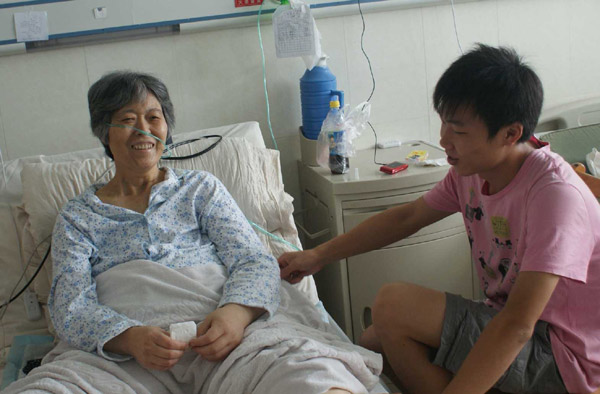All she has left is words
Updated: 2011-09-09 07:18
By Guo Rui (China Daily)
|
|||||||||||
WUHAN - Unlike many dying patients, Wu Aiping looks peaceful and pleased in her final days, and she has left a precious gift to the person she cares most about in the world - her 18-year-old daughter.
 |
|
Wu Aiping (left), a terminal cancer patient in Wuhan, Hubei province. [Photo / China Daily] |
With the help of hospice service volunteers, Wu has made a life journal, filled with the moments she cherishes most and with the hopes for her daughter Fu Siqi to live happily and be thankful for everything.
"I don't want her to live under the shadow of my death," Wu told China Daily with tears spinning in her eyes.
Wu has been sick for the last 30 of her 51 years. She had an operation for serious heart disease in 1981, and then was found to have cancer in her left breast in 1985 and in her right breast in 1996.
Last year she was diagnosed with uterine cancer, and in April the cancer caused kidney failure.
She can't drink or eat, and her life is sustained by numerous saline and nutrient tubes.
The hospice service of Zhongnan Hospital, provided by 20 medical students at Wuhan University, offers humane and compassionate care for low-income people in the last phases of incurable disease so they may live as fully and comfortably as possible.
Since 2001, the team has helped more than 4,500 terminal cancer patients spend their last days in greater ease. This year it launched a program encouraging patients to write down their last words for the people they care for the most. Students also help patients to make digital versions and video clips of the journal.
"The journal helps patients look back on their lives objectively. Throughout the whole process they can say goodbye to the world peacefully, with dignity, and without any regret," said Xiong Xiaotao, 22, a junior from Wuhan University and a team member.
Wu recalled when she opened her door to find Xiong dressed in a pink T-shirt.
"When I first saw Xiaotao, this immature boy, I wondered what he could do for dying people," Wu said.
Their first chat, however, lasted for nearly four hours.
"Maybe his sincerity moved me and he was very attentive to me," Wu said.
Since Wu was too weak and delirious to write, Xiong recorded all the words Wu wanted to say and put them together with photos collected from Wu's family albums.
Three months later, he presented the journal to Wu, who burst into tears.
In the journal, which reads like a long letter to her daughter, Wu expresses her biggest regret - that her daughter gave up learning the accordion and dancing because the family couldn't afford it.
"It was mom's fault, because of the illness, to make your dreams fly far away. Sorry, dear, it was the greatest sadness in my life."
She is most proud of her daughter, a freshman student at Hubei University of Economics.
"You are so cute, obedient and independent, a good child. But you smile very little, and your temperament must be affected by mom's illness."
Wu Xin, who is in charge of the hospice service program, said Wu always smiles when talking about death and is one of the toughest people she has ever known.
She said patients have changed a lot in their last days through the efforts of the hospice service.
"Our target is to help them to be clear on the meaning of life, without fear and regret," she said.
Zhou Lihua contributed to this story.











